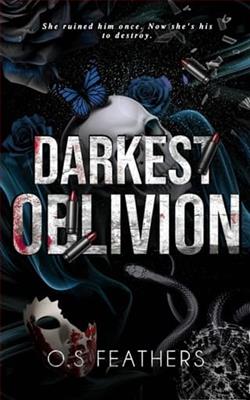Page 44 of Captive Virgin of the Bratva
It wasn’t kindness; it was maintenance. Keeping me alive, not because they care, but because I still serve a purpose.
Panic coils low in my chest, winding tighter with each breath. I can’t stop shaking. My hands curl into fists in the sheets, white-knuckled and useless.
William.
His name comes like a punch to the throat.
For a heartbeat, I can’t breathe. My chest caves in around the thought.
He did this. He led me back here—fed me hope, warmth, the illusion of safety—only to open the door and revealhim.
Kolya.
Sitting like a king, smug and silent, as if he knew I’d come crawling back eventually. As if this whole thing had been orchestrated to remind me that running was never an option. That nothing is ever mine—not my freedom, not my life, not even my trust.
I curl in on myself, knees to my chest, forehead resting against bone. The thin blanket offers no warmth. I feel everything: the sting of betrayal, the pulse of my heartbeat against cracked ribs, the cold pressing in from every direction.
I don’t cry. Tears would mean admitting it. That this is final. That I have nothing left.
Instead, I rock slightly, back and forth, chasing the motion like it might ground me. The silence begins to sound louder the longer it lasts, like the walls themselves are whispering all the things I don’t want to hear.
You’re alone.
You’re trapped.
He owns you.
I dig my nails into my shins and focus on the burn. On the small, sharp pain I can control. My breath starts to even out. The edges of the room stop spinning.
The fear doesn’t go. I used to think fear was something loud—screams, panic, running. But this kind of fear is quieter. Colder. It seeps into your bones and makes a home there, whispering that there’s no one coming, that the people you love will be the ones to hand you over.
I hear the door creak from somewhere in the house. Footsteps now.
I flinch automatically, spine going rigid. The steps fade again, swallowed by the distance.
A false alarm. Still, I don’t uncurl. I stay in that tight, clenched position, trying to hold on to something—anything—that feels solid.
That’s when I realize it’s raining.
The first drop lands with a faint, hollow tap against the window. Then another.
Then dozens—hundreds. Rain falls in sheets, hammering the glass and roof with rhythmic violence, a deep, endless percussion that seeps into the walls and floors. The sound surrounds me, swallows me whole. I lift my head from my knees just as the first thunderclap hits.
It splits the silence like a knife.
My breath catches hard. Too hard. I double over, hands clutching my ribs, my throat tight and closing, like the air itself has turned to smoke. My heart pounds so violently it’s all I can hear—until another rumble follows, this one louder, longer, deeper. It rolls through the room like it’s crawling across the floor, shaking the cracked boards under me, the very air vibrating in my chest.
A choked sob escapes me before I can stop it.
I try to count my breaths, the way I learned in med school, the way I teach patients in trauma: inhale, two, three—exhale, two, three—but my lungs won’t cooperate. The air won’t move right. It scratches at my throat like glass, leaving me gasping, panicking.
The thunder comes again, closer this time. Like it’s chasing me. Hunting me down in this godforsaken room.
Suddenly, I’m not here anymore.
I’m eight.
A child huddled under thin blankets in the attic bedroom of the third foster house that month. Alone. Freezing. Thunder shaking the ceiling above me while strangers argued downstairs—doors slamming, glass breaking. Rain pouring in through the broken window because no one had bothered to fix it. I remember the taste of it—rust and cold—and the way my hands wouldn’t stop shaking, even when I bit them until they bruised.















